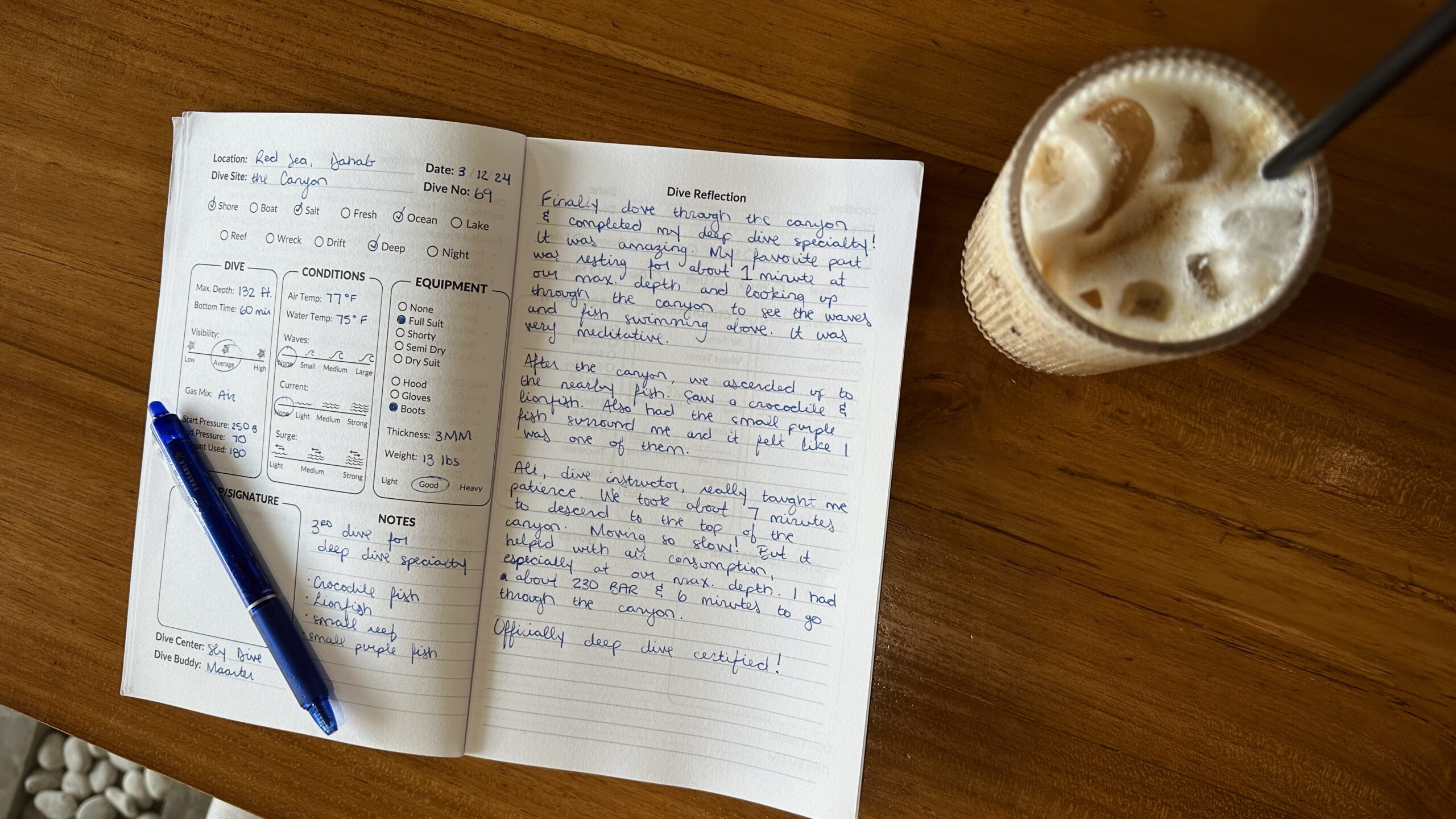Do You Log Your Dives?
After a day of diving, do you:
- Log your dives immediately while everything is fresh?
- Wait a few days (or weeks) before jotting down the details?
- Never log your dives at all?
If you’re in the first two groups, great! Documenting your dives helps you track your experience and relive your underwater adventures. But if you never log your dives, you might want to reconsider.
It’s easy to rely on your dive computer to store your data, but physically logging your dives, whether in an app or a logbook, allows you to capture more than just the numbers. Your dive computer might save your depth and bottom time, but it won’t record how you felt underwater, the marine life you encountered, or the little moments that made the dive special.
That’s where journal prompts for scuba diving come in. Using reflection prompts can help you dive deeper into your experiences, making each log more meaningful and helping you stay present on future dives.
Why You Should Log Your Dives
Every diver logs their experience differently. Some note every detail, from dive conditions to marine life, while others stick to the bare essentials: depth, bottom time, and air consumption. Whatever your approach, logging your dives is more valuable than you might think.
Keeping track of your dives helps you:
- Ensure accurate dive count and experience level when diving with a new shop.
- Look back at past dives and relive incredible underwater moments.
- Identify trends in buoyancy, air consumption, or comfort levels over time.
- Remember all the places you dove and your general impression of those sites.
Before I started my Divemaster training, I rarely dove with a dive computer (unless it was included in the price). After a dive, I’d quickly ask the guides for key details that I would jot down in the Notes app on my phone. I wouldn’t actually log the dive in my PADI app until days (sometimes weeks) later. By then, the memories blurred. I could remember where I dove but struggled to recall how I felt.
That’s when I started incorporating journaling into my post-dive routine. It wasn’t about writing a novel but taking a few moments to reflect. Now, I end my dive days with a cup of tea, coffee, or beer, journaling about what stood out, what I learned, and how I felt underwater.
10 Journal Prompts for Post-Dive Reflection
You don’t need to spend hours reflecting, but a few minutes of journaling can enhance your diving experience and help you become more present on future dives.
Try these 10 journal prompts after your next dive:
- What was the most memorable moment of the dive?
- What emotions did I feel during and after the dive?
- Did I experience any challenges? How did I handle them?
- What can I learn from this dive and apply next time?
- How did my breathing and movement feel underwater?
- Did I have any moments of stillness or deep connection with the ocean?
- What wildlife or underwater features stood out to me?
- If I could describe this dive in one word, what would it be and why?
- Did this dive shift my perspective in any way?
- What did I appreciate most about this dive?
Resurfacing and Reflecting
Journaling after diving or logging a dive isn’t a requirement, but it can deepen your connection with the ocean and make you more present on future dives. Since adding it to my routine, I’ve noticed I pay more attention underwater, knowing I’ll reflect on the experience later.
Remember, mindfulness doesn’t just happen after a dive. It starts the moment you enter the water. If you want to stay even more present during your dives, check out these 4 Mindful Diving Techniques for Beginners to help you focus, slow down, and fully immerse yourself in the underwater world.
After your next dive, try one of these prompts and see how it changes your experience. And if you do, let me know how it went!

